- Michigan woman is attacked days after her same-sex marriage was seen on local TV
- Michigan is one of 19 states that do not specifically protect LGBT community in hate crime statute
- 2009 federal Hate Crimes Prevention Act has not been extended to individual states
- Former state legislator: "There are still glaring gaps in the laws that generally protect people"
(CNN) -- Nine days after her same-sex wedding, a 28-year-old Michigan woman was set upon on her way home from work, knocked unconscious by three men who kicked and punched her while shouting anti-gay epithets.
"Hey b----, aren't you that f----- from the news?" one of the men asked, according to police.
The assailants in Monday's assault recognized her from local TV news coverage of her wedding, said Derrick Jackson, a spokesman for the Washtenaw County Sheriff's Office. She and her partner were among the many gay and lesbian couples to recently make their unions official after a federal court struck down a Michigan amendment restricting marriage to one man and one woman.
The victim, who doesn't want to be identified, got herself to a hospital with significant bruising and swelling to the right side of her face as well as her torso and arm, Jackson said. Police in Washtenaw County -- about 30 miles west of Detroit -- were looking for the attackers.
In many states, hate crime charges could be brought in such cases, but Michigan is one of 19 states that do not include sexual orientation in their hate crime laws, according to Sarah Warbelow, state legislative director for the Washington-based Human Rights Campaign, a national lesbian, gay, bisexual and transgender advocacy group.
Michigan's hate crime law, known as the ethnic intimidation statute, protects people against crimes based on their "race, color, religion, gender, or national origin."
But Michigan prosecutors acknowledge the law is inadequate, and lesbian, gay, bisexual and transgender (LGBT) advocates agree.
"People on the other side of this issue tend to think of it as the LGBT community looking for a special right," said Yvonne Siferd, director of victim services for Equality Michigan, a statewide LGBT anti-violence and advocacy organization. "It's not a special right to walk down the street holding the hand of people you love and not be attacked."
For more than two decades, advocacy groups have been pushing for states to adopt hate crime laws to include the LGBT community or expand existing laws to do so, according to the Human Rights Campaign. The laws would impose stricter sentences, increase accountability on assailants and broaden crimes to include hate crimes against property.
The District of Columbia was the first jurisdiction to include sexual orientation and gender identity in hate crime laws in 1989, according to Warbelow. In 2001 and 2002, she said, advocates pushed for states to specifically protect the LGBT community in hate crime laws. The clamor was a direct response to the case of Matthew Shepard, a gay teenager who died after being tied to a fence in Wyoming and beaten in 1998.
In 2009, President Barack Obama signed into law The Matthew Shepard and James Byrd Hate Crimes Prevention Act, making hate crimes a federal offense in an attempt to protect members of the nation's LGBT community and other groups from bias-motivated violence.
Advocates hailed the federal law's passage as a step in the right direction, but legislators appear to have abandoned efforts to expand it on a state level.
"Legislators have it stuck in their head that because it's a federal law, they don't have to pass it on a state level," Warbelow told CNN. "But there is a limited number of money the feds have to investigate hate crimes. It is much more ideal for states to have mechanisms to take on hate crime themselves."
The first effort at expanding Michigan's ethnic intimidation statute dates back to 1997, according to Ari Adler, press secretary for Michigan state house speaker Jase Bolger.
But opponents have said that expanding the statute would make gays and lesbians a special class of citizens and signal that crimes against the LGBT community are more serious than those committed against heterosexuals, according to the state legislature's Journal of the House.
Chris Kolb, Michigan's first openly gay state legislator, was the primary sponsor of the bill expansion in 2001. He said the opposition reflected a basic lack of education about gay rights, the philosophy that you shouldn't add an additional penalty to a crime, and the fact that some people did not want to give special recognition to the LGBT community.
"There are still glaring gaps in the laws that generally protect people," said Kolb, a former state representative who now heads an organization called the Michigan Environmental Council.
"Hate crimes, while they may be committed against an individual person, are aimed at the entire group of people they represent -- that's why they are different than just a crime," he said. "They are sending a message to a group of people."
Michigan police officers are required to record data and report information for reported crimes, including whether sexual orientation was a factor, according to Warbelow. But prosecutors can't bring charges beyond the actual assault.
"The federal government ... wanted to see how much of a problem hate crimes were," Warbelow said. "The difference was the government took the data and said it was a problem and changed the law. Michigan has not."
Washtenaw County police say they don't have any reason to believe the 28-year-old Michigan woman attacked on her way home is not credible. Police have no leads at this time.
She told police she believes the prior publicity contributed to the attack.
The police investigation continues, and whatever evidence is gathered will be turned over to prosecutors.
Steven Hiller, chief assistant prosecutor for Washtenaw County, said prosecutors could contact U.S. attorneys if they determine that federal law is applicable. "If the motivation for the crime was a person's sexual orientation, it just doesn't fall within the ethnic intimidation statute," he said.
Hiller added, "It is not an unheard-of situation for our office to contact the U.S. attorney in appropriate circumstances to look at a particular case if federal law addresses a situation better than state law does."
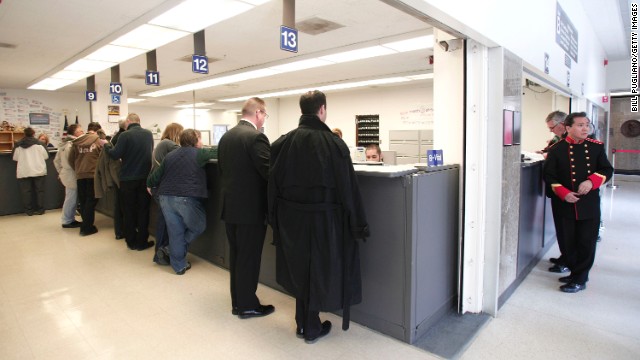 Same-sex couples get their marriage licenses at the Oakland County Courthouse on Saturday, March 22, in Pontiac, Michigan, a day after a federal judge overturned Michigan's ban on same-sex marriage.
Same-sex couples get their marriage licenses at the Oakland County Courthouse on Saturday, March 22, in Pontiac, Michigan, a day after a federal judge overturned Michigan's ban on same-sex marriage.  Jayne Rowse, left, speaks as April DeBoer kisses her shoulder during a news conference in Ferndale, Michigan, on Friday, March 21. A federal judge struck down Michigan's ban on same-sex marriage on Friday after the two nurses, who have been partners for eight years, claimed the ban violated their rights under the U.S. Constitution. It's the latest in a series of decisions overturning similar laws across the country.
Jayne Rowse, left, speaks as April DeBoer kisses her shoulder during a news conference in Ferndale, Michigan, on Friday, March 21. A federal judge struck down Michigan's ban on same-sex marriage on Friday after the two nurses, who have been partners for eight years, claimed the ban violated their rights under the U.S. Constitution. It's the latest in a series of decisions overturning similar laws across the country. 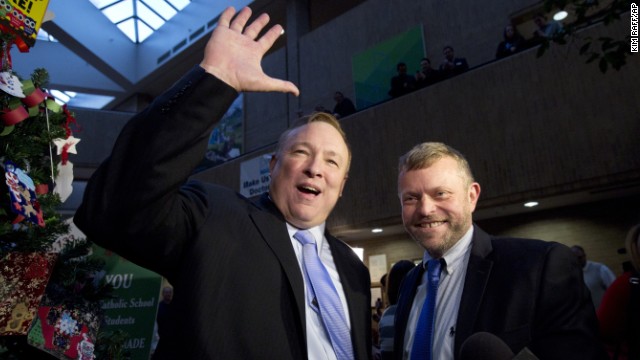 Utah state Sen. Jim Dabakis, left, and Stephen Justesen acknowledge the crowd after being married in Salt Lake City on Friday, December 20. A federal judge struck down Utah's ban on same-sex marriage, saying it conflicted with the constitutional guarantees of equal protection and due process. Many Utah counties began issuing marriage licenses before the state appealed to the U.S. Supreme Court. The high court temporarily blocked enforcement of the lower court ruling until the constitutional questions are fully resolved.
Utah state Sen. Jim Dabakis, left, and Stephen Justesen acknowledge the crowd after being married in Salt Lake City on Friday, December 20. A federal judge struck down Utah's ban on same-sex marriage, saying it conflicted with the constitutional guarantees of equal protection and due process. Many Utah counties began issuing marriage licenses before the state appealed to the U.S. Supreme Court. The high court temporarily blocked enforcement of the lower court ruling until the constitutional questions are fully resolved. 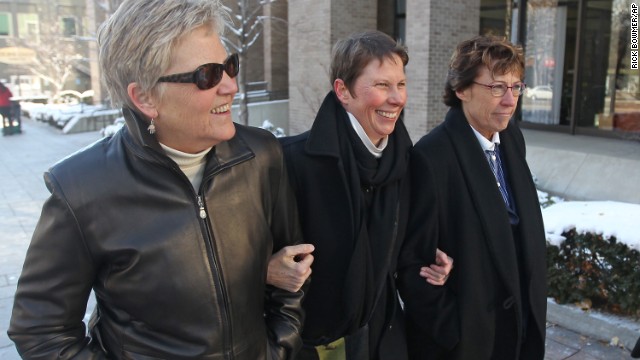 Plaintiffs Laurie Wood, left, and Kody Partridge, center, and their attorney Peggy Tomsic leave a federal courthouse in Salt Lake City on Wednesday, December 4, where a judge heard arguments challenging Utah's same-sex marriage ban.
Plaintiffs Laurie Wood, left, and Kody Partridge, center, and their attorney Peggy Tomsic leave a federal courthouse in Salt Lake City on Wednesday, December 4, where a judge heard arguments challenging Utah's same-sex marriage ban. 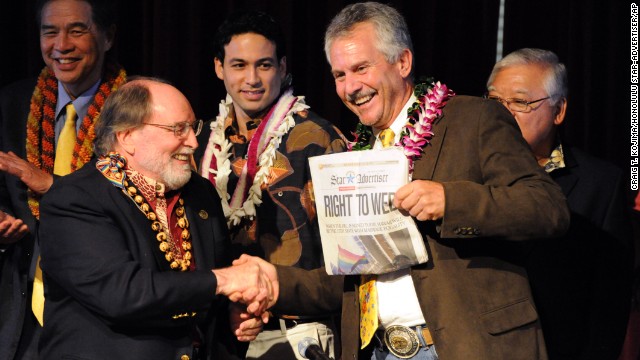 Hawaiian Gov. Neil Abercrombie, left, and former Sen. Avery Chumley hold up a copy of the Star Advertiser after Abercrombie signed a bill legalizing same-sex marriage in Hawaii on Wednesday, November 13, in Honolulu. Hawaii's same-sex marriage debate began in 1990 when two women applied for a marriage license, leading to a court battle and a 1993 state Supreme Court decision that said their rights to equal protection were violated by not letting them marry. Now the state is positioning itself for an increase in tourism as visitors arrive to take advantage of the new law, which took effect December 2.
Hawaiian Gov. Neil Abercrombie, left, and former Sen. Avery Chumley hold up a copy of the Star Advertiser after Abercrombie signed a bill legalizing same-sex marriage in Hawaii on Wednesday, November 13, in Honolulu. Hawaii's same-sex marriage debate began in 1990 when two women applied for a marriage license, leading to a court battle and a 1993 state Supreme Court decision that said their rights to equal protection were violated by not letting them marry. Now the state is positioning itself for an increase in tourism as visitors arrive to take advantage of the new law, which took effect December 2. 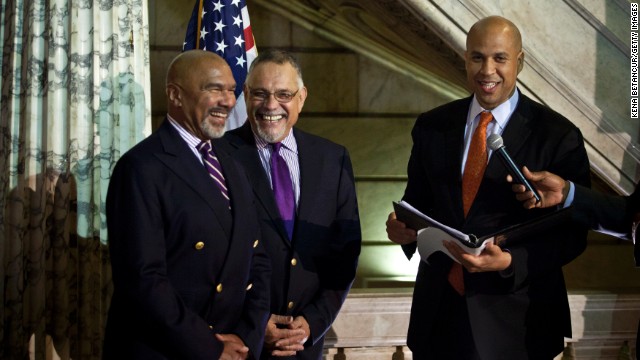 Cory Booker, then-Newark mayor, officiates a wedding ceremony for Joseph Panessidi and Orville Bell at City Hall early Monday, October 21, 2013. The New Jersey Supreme Court denied the state's request to prevent same-sex marriages temporarily, clearing the way for same-sex couples to marry in the state on October 21.
Cory Booker, then-Newark mayor, officiates a wedding ceremony for Joseph Panessidi and Orville Bell at City Hall early Monday, October 21, 2013. The New Jersey Supreme Court denied the state's request to prevent same-sex marriages temporarily, clearing the way for same-sex couples to marry in the state on October 21.  A couple celebrate at San Francisco City Hall upon hearing about the U.S. Supreme Court rulings on same-sex marriage on June 26, 2013. The high court cleared the way for same-sex couples in California to resume marrying after dismissing an appeal on Proposition 8 on jurisdictional grounds. In another ruling June 26, the justices threw out part of a law that denied hundreds of federal benefits to married same-sex couples.
A couple celebrate at San Francisco City Hall upon hearing about the U.S. Supreme Court rulings on same-sex marriage on June 26, 2013. The high court cleared the way for same-sex couples in California to resume marrying after dismissing an appeal on Proposition 8 on jurisdictional grounds. In another ruling June 26, the justices threw out part of a law that denied hundreds of federal benefits to married same-sex couples. 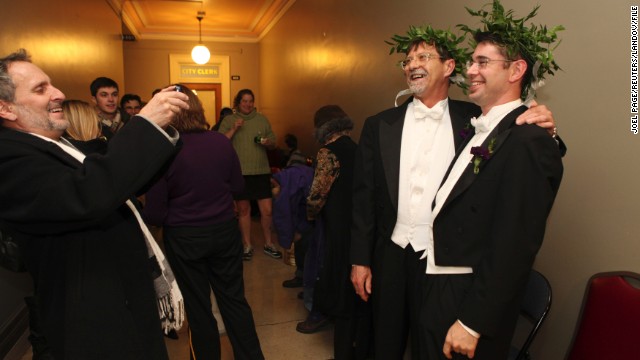 In the other June 26 ruling, the Supreme Court struck down a key part of the Defense of Marriage Act, a 1996 federal law defining marriage as between a man and a woman. Jamous Lizotte, right, and Steven Jones pose for photos while waiting for a marriage license in Portland, Maine, in December 2012.
In the other June 26 ruling, the Supreme Court struck down a key part of the Defense of Marriage Act, a 1996 federal law defining marriage as between a man and a woman. Jamous Lizotte, right, and Steven Jones pose for photos while waiting for a marriage license in Portland, Maine, in December 2012. 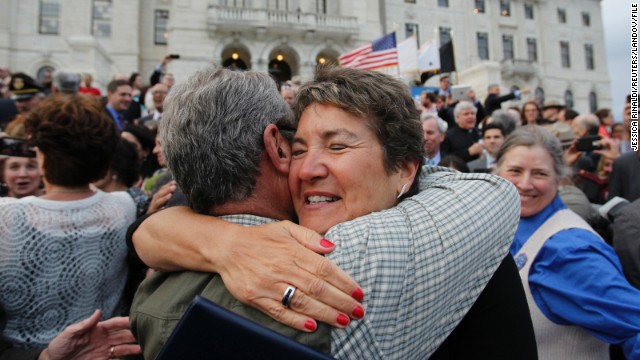 Rhode Island state Sen. Donna Nesselbush, right, embraces a supporter after the Marriage Equality Act gets signed into law at the statehouse in Providence on May 2, 2013.
Rhode Island state Sen. Donna Nesselbush, right, embraces a supporter after the Marriage Equality Act gets signed into law at the statehouse in Providence on May 2, 2013. 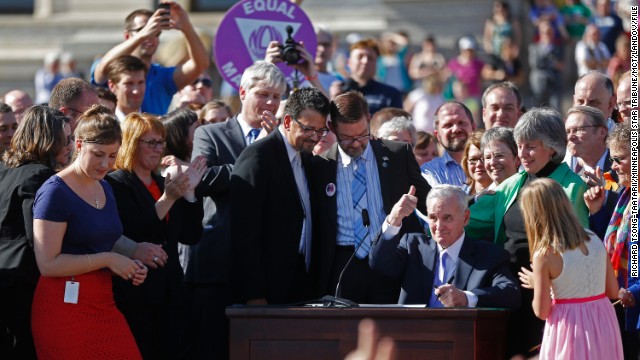 At the state Capitol in St. Paul on May 14, 2013, Minnesota Gov. Mark Dayton signs a bill legalizing same-sex marriage.
At the state Capitol in St. Paul on May 14, 2013, Minnesota Gov. Mark Dayton signs a bill legalizing same-sex marriage. 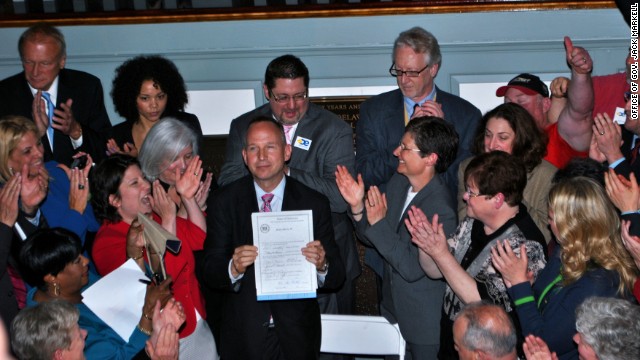 Delaware Gov. Jack Markell holds up legislation on May 7, 2013, allowing same-sex couples to wed.
Delaware Gov. Jack Markell holds up legislation on May 7, 2013, allowing same-sex couples to wed. 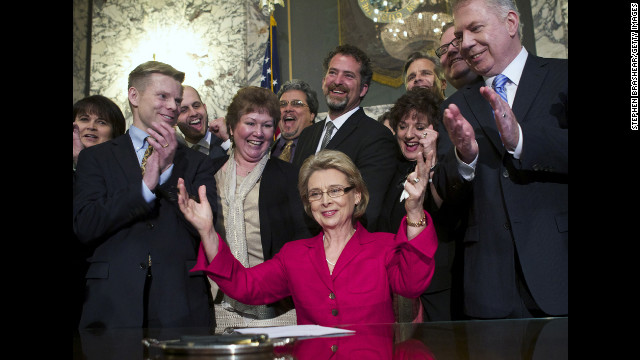 Washington Gov. Chris Gregoire celebrates after signing marriage equality legislation into law earlier in 2013. Voters there approved same-sex marriage on Election Day 2012.
Washington Gov. Chris Gregoire celebrates after signing marriage equality legislation into law earlier in 2013. Voters there approved same-sex marriage on Election Day 2012. 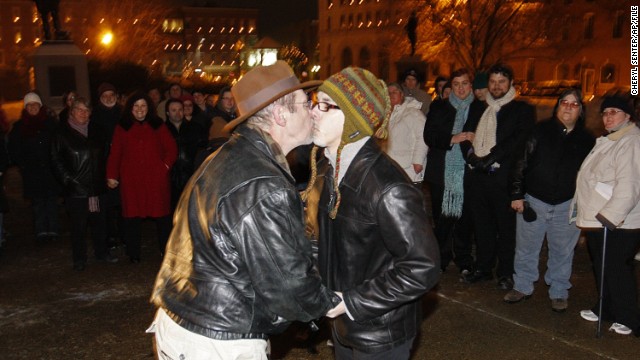 Olin Burkhart, left, and Carl Burkhart kiss on the steps of the New Hampshire Capitol in Concord in January 2010 as the state's law allowing same-sex marriage goes into effect.
Olin Burkhart, left, and Carl Burkhart kiss on the steps of the New Hampshire Capitol in Concord in January 2010 as the state's law allowing same-sex marriage goes into effect. 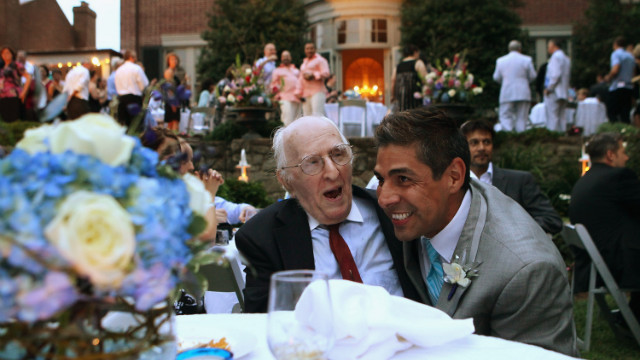 In 2010, television reporter Roby Chavez, right, shares a moment with gay rights activist Frank Kameny during Chavez and Chris Roe's wedding ceremony in the nation's capital.
In 2010, television reporter Roby Chavez, right, shares a moment with gay rights activist Frank Kameny during Chavez and Chris Roe's wedding ceremony in the nation's capital. 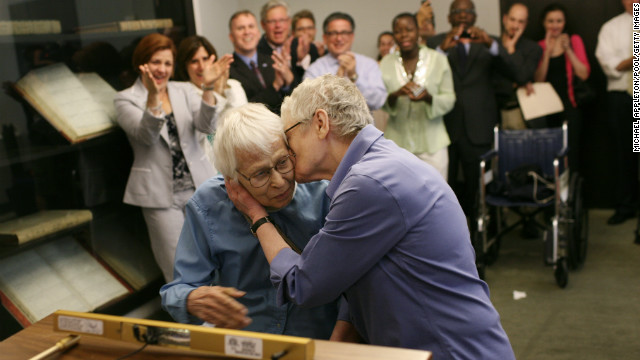 Phyllis Siegel, 76, kisses her wife, Connie Kopelov, 84, after exchanging vows at the Manhattan City Clerk's office in 2011.
Phyllis Siegel, 76, kisses her wife, Connie Kopelov, 84, after exchanging vows at the Manhattan City Clerk's office in 2011. 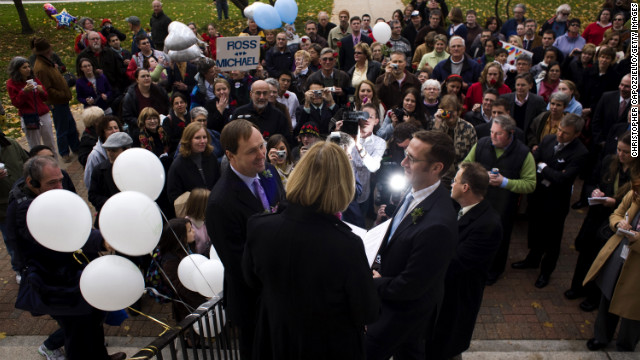 Michael Miller, left, and Ross Zachs marry on the West Hartford Town Hall steps after same-sex marriages became legal in Connecticut in 2008.
Michael Miller, left, and Ross Zachs marry on the West Hartford Town Hall steps after same-sex marriages became legal in Connecticut in 2008.  Maryland Gov. Martin O'Malley, center, shakes hands with Senate President Thomas V. Mike Miller after signing a same-sex marriage bill. The law was challenged, but voters approved marriage equality in a November 2012 referendum.
Maryland Gov. Martin O'Malley, center, shakes hands with Senate President Thomas V. Mike Miller after signing a same-sex marriage bill. The law was challenged, but voters approved marriage equality in a November 2012 referendum. 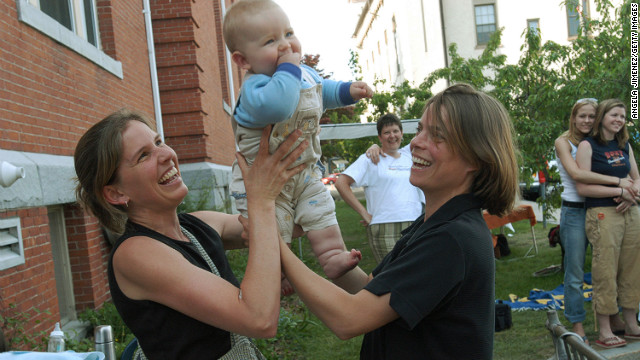 Lara Ramsey, left, and her partner of eight years, Jane Lohmann, play with their 7-month-old son, Wyatt Ramsey-Lohmann. The two wed in 2004 after Massachusetts approved same-sex marriage.
Lara Ramsey, left, and her partner of eight years, Jane Lohmann, play with their 7-month-old son, Wyatt Ramsey-Lohmann. The two wed in 2004 after Massachusetts approved same-sex marriage. 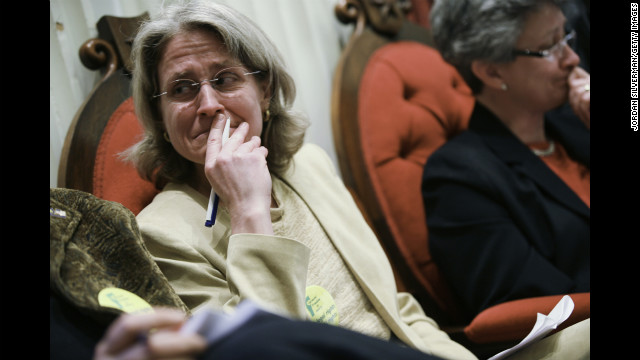 Beth Robinson of the Vermont Freedom to Marry Task Force was among those who fought for marriage equality in Vermont in 2009.
Beth Robinson of the Vermont Freedom to Marry Task Force was among those who fought for marriage equality in Vermont in 2009. 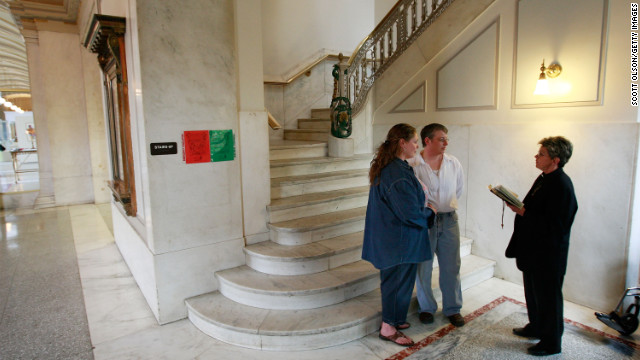 Amy Klein-Matheny, left, and her wife, Jennifer, were married in 2009 in Iowa after same-sex couples were allowed to marry there after a court ruling.
Amy Klein-Matheny, left, and her wife, Jennifer, were married in 2009 in Iowa after same-sex couples were allowed to marry there after a court ruling. 



















No comments:
Post a Comment